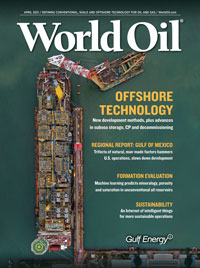Issue: April 2021
Special Focus
A vessel-deployed mechanical cutting device reduces the cost of offshore wellhead removal.
Using an innovative snubbing/hydraulic workover unit, in conjunction with a semisubmersible well intervention vessel, enabled an operator to clean out 5½ miles of decommissioned deepwater GOM pipeline in an environmentally safe and cost-effective manner.
A synergistic approach to finishing responsibly goes beyond traditional barrier placement for P&A and helps the operator to achieve the best possible environmental and financial results.
Subsea systems offer flexible offshore storage of oil and condensate. NOV has developed the technology further into a safe, eco-friendly option for the subsea storage and injection of chemicals.
Innovative technology and new ways of working are changing the way firms think about cathodic protection surveys and optimisation, increasing both the efficiency and efficacy, while reducing the carbon footprint.
This first of two articles following up Frontier Deepwater’s February 2020 World Oil article clarifies how and why industry’s efforts to develop the massive Wilcox Lower Tertiary trend in the ultra-deep waters of the Gulf of Mexico with subsea hub-spoke systems and strategies have failed commercially.
An innovative technological solution has overcome flexible pipe corrosion cracking in high CO2 content fields, including Brazil’s pre-salt offshore developments. The new pipe system is verified to extend service life by at least 50%, compared to standard flexibles.
Features
Despite a modest reduction in the DUC inventory, there are still 7,086 wells waiting on completion. With the industry in disarray, it has become increasingly likely that many of these horizontal boreholes may never be completed.
A machine learning workflow can quickly, and accurately, predict mineralogy, porosity and saturation in multiple wells to better understand productive layers in unconventional oil reservoirs.
The need to digitally transform — by taking actions such as streamlining and automating business processes, managing data across the organization and overseeing remote workers — is only greater in the face of COVID-19 developments.
As regulatory requirements and ESG reporting and transparency increase to address gas flaring, “clean fracs” could be one solution for upstream oil and gas companies towards an energy transition.
One way to reduce frac fleet costs in the Permian is to decrease the rate of seat replacements by utilizing new carbide technology.
Mineral industry technology provides an approach for shallow oil exploration.
Remaining Operators Brush Aside Higher Prices
Trifecta hammers U.S. operations
As a global medical and occupational healthcare provider, Remote Medical International (RMI) has been battling Covid-19 offshore for the past year. Through its work mobilizing “Covid Copters,” as well as providing specialist medical support to some of the world’s most remote locations, RMI provides unique insight into activities since the pandemic first hit.
Edge computing, AI and machine learning, and IIoT technology serve as key enablers to deliver safer and more environmentally sustainable operations by reducing human and carbon footprints, while increasing operational efficiency and productivity.
Columns
The combination of artificial intelligence, machine learning and the industrial internet of things is enabling remote operations and automation capabilities, leading to greater adoption and proliferation of intelligent oilfield operations.
What way out of the crisis for Russia?
More “small thinking” with big paydays
Solution development for a sustainable future
Signs of life emerge from the Eagle Ford
Resources



